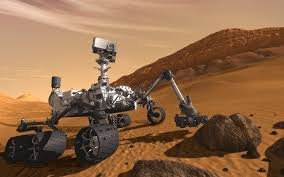The US space organization launched its plan to build permanent settlements on the red planet, setting out in detail plans to create ‘deep-space habitation facilities’ in an effort to act as stepping stones to Mars.
In a new report entitled ‘Journey to Mars’ NASA said the mission was ‘historic pioneering endeavor’ similar to the early settlers in America and Moon landing.
“Like the Apollo programme, we embark in this adventure for all humanity,” the report states. “Unlike Apollo, we will be going to stay.
“In the next few decades, Nasa will take steps toward establishing a human presence beyond Earth.
“We seek the capacity for people to work, learn operate and sustainably live beyond Earth for extended periods of time. Any journey to Mars will take many months each way and early return is not an option.
“Efforts made today and in the next decade will lay the foundation for an Earth Independent, sustained presence in deep space. Living and working in space require accepting risk and the journey is worth the risk.”
NASA has divided the challenge of getting to Mars into three stages; Earth reliant, proving ground and Earth independent.
NASA says it is also committed to designing ‘a new and powerful transportation’ system which will involve solar electric propulsion, using the Sun’s energy to take spacecraft deeper into space. Cargo ships will being shuttling supplies to Mars, months or even years before the first humans land.
It is hoping that the upcoming Asteroid Redirect Mission, which seeks to bring an asteroid into lunar orbit where it can be studied, will be using solar propulsion, and Mars scientists will be following its progress closesly.
“NASA’s strategy connects near-term activities and capability development to the journey to Mars and a future with a sustainable human presence in deep space,” said William Gerstenmaier, associate administrator for Human Exploration and Operations at NASA Headquarters.”
Probes and robotic rovers like Curiosity have already been on or around Mars for 40 years and Nasa will continue to send new landers in the coming decades to gather more information about the planet ahead of landing. Recent discoveries have shown that salt water which could sustain life is likely to be flowing on Mars. The remains of ancient lakes and river beds are also present.
The report concludes: “NASA and its partners are working on the solutions every day so we can answer some of humanity’s fundamental questions about life beyond Earth: Was Mars home to microbial life? Is it today? Could it be a safe home for humans one day? What can it teach us about life elsewhere in the cosmos or how life began on Earth? What can it teach us about Earth’s past, present and future?”
However Nasa may be beaten. The Mars One project, set up by a nonprofit organization based in the Netherlands has proposed to land the first humans on Mars and establish a permanent human colony there by 2027

This is great news! Love how technology is advancing in ways I always dreamed of as a child.
Hi! I am a robot. I just upvoted you! I found similar content that readers might be interested in:
http://www.telegraph.co.uk/science/2016/03/14/nasa-planning-earth-independent-mars-colony-by-2030s/